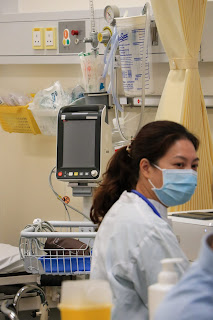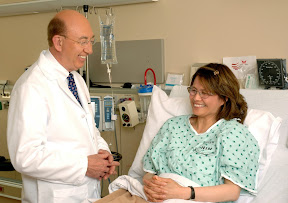What
is it that makes intensive care physicians somewhat more vulnerable to
medico-legal problems?
Intensive
care units treat seriously ill patients. In spite of ‘intensive’ care and best
efforts of the team, morbidity and mortality rate is high compared to other
units. Considering the complexity of the critical illnesses and the highly
invasive interventions that are routinely carried out, one can easily explain
the higher morbidity and mortality. Reportedly, the average mortality rate is 30 %
-- considerably
more than the average risk. American statistics reveal that 1 out of 5
Americans will die in an ICU. Figures for our country are not available. Hence
the specialty–related malpractice litigation may be related more to a bad
outcome rather than negligence. It is like shooting the messenger for the message!!
The urgency, complexity, and invasive nature of intensive care increase the risk
of legal exposure to its practitioners. Life and death situations are common in
intensive care settings and ICU caregivers may find themselves playing God at
times! The Covid pandemic experience of critical physicians will re-affirm
this.
The old assumption that intensive care saves lives and any injury or mishap that occurs in the process is therefore unquestionably accepted by patients or relatives no longer holds good.
Nursing workload may contribute to nursing-related iatrogenic complications. Shortage of trained staff and inexperience with equipment are also important issues
REMEMBER
📌Good records= Good defense
📌Legally, what is not documented never happened!
What are the qualities of good records?
Good records ought to be correct, clear, comprehensive, chronological and
contemporaneous.
CAUTION: Incredibly, even today, a large number of
physicians record only the date of examination and do not think it
essential to record the time of examination. To have to stress the
importance of writing the time of examination, especially in an ICU setting, would
surely be a no-brainer. And yet, this lapse in record–keeping is not as
uncommon as one may imagine. It may be worthwhile for you to conduct a quick
random audit of your case papers to confirm this.
TIME must inevitably follow DATE, in your patient entries. It may appear trivial but it could be of crucial importance in many a case.

Another area that is a potential minefield, as far as medico-legal liability is concerned, is patient consent for undertaking treatment
✔Make sure the patient understands the nature of his condition, the alternate treatments or procedures, nature of proposed treatment, risks of proposed or alternate procedures and the chances of success or failure of the treatment.
✔Mere signature on a pre-printed consent form is not adequate. It should be specifically recorded that a discussion took place and patient/relatives were explained the contents.
✔Consent should be ‘procedure specific’. Blanket consents are faulted by courts.
✔Refusal of
consent or denied consent should be recorded, signed and witnessed.
Quite recently in a Delhi hospital, the procedure of inserting a central venous line resulted in injury to the jugular vein following which the patient was shifted to a higher center for emergency treatment. A complaint before the National Consumer Forum ended up with compensation of Rs 7 lakhs being awarded to the patient .The court averred that a specific informed consent ought to have been taken for the procedure which was invasive in nature and had the potential of causing serious complications.

In the event of such allegations, the hospital would need to establish that Infection control measures were in place (e.g. handwashing protocol, infection control committee, etc.} and documentation of such control measures would have to be proved.
Importantly, when we speak of communication, it
refers not only to communication between you and the patient or relatives but
also inter-communication between the multitude of caregivers viz. fellow
consultants, resident doctors, nurses, physiotherapists, and so on.
It is vital that there are no discordant notes in
the communication with the patient or relatives. Differing versions are
hazardous and all caregivers should be on the same page. It is important that the patient
and family do not pick up conflicting messages about the patient’s progress and
expected outcome.
The importance of patient notes and documentation has already been
mentioned. The importance gets further emphasized when we realize that good
patient notes are indeed a very good vehicle of communication between the
various caregivers attending to the patient. The value of this would be
further enhanced if the notes were to not only record clinical findings and
events but the reason why decisions
were made.
A sharing of uncertainty early on in the
physician-patient or physician-family relationship may deter litigation driven
by bad outcomes alone. Because all medical procedures have an inherent risk of
adverse outcome, the doctrine of the informed consent must be followed closely.
Sound advice from an editorial of South
African Journal of Critical care Vol27 No.1
…… intensive care management should be team-based. The ICU team includes the nurses, doctors, dieticians, physiotherapists, and others contributing to patient care on a daily basis. The team needs a leader, preferably an intensivist who encourages a ‘flat hierarchy and an open and effective communication system.11 This requires a joint ward round where the various professionals can provide their input and remind, challenge, and support each other. Even a very good but dominant individual cannot beat a team when it comes to decision-making.12 A harmonious team also means that the patient and family do not pick up conflicting messages about the patient’s progress and expected outcome
Finally, establishing a good rapport with the family of the patient (who are indeed the patient’s surrogate decision makers) by empathizing with them in an emotionally difficult time pays good dividends in terms of quelling any grievances which could escalate into full-blown medico-legal issues.
MEDICO-LEGAL CHALLENGES ARISING OUT OF END-OF-LIFE ISSUES AND WITHDRAWAL OF LIFE SUPPORT AND WITHOLDING LIFE SUPPORT
This is a major challenge ., here are a few salient points.
o End-of-life
issues are potential landmines for intensive care physicians
o In our country, changes in the law have not kept pace
with advances in medicine. We do not have an unambiguous legal stand on end-of-life issues. Lack of
clarity of laws causes much stress in ICU caregivers.
o Though it is now accepted that the right to life
includes the right to die with dignity, there are no clear answers to the question “Is it ethical to limit life-prolonging interventions when poor status
of a patient indicates these to be non-beneficial?”
o Do Not Resuscitate documentation by Critical care physicians, despite absence of Advance Directive by the patient has been very well defined recently in the ICMR Consensus Guidelines on DNR (Indian J Medical Res April 2020) and it is advisable that these should be scrupulously followed while recording DNR orders by the patient or his relatives. Following is the link for the same and every intensivist and critical care specialist should read it carefully.
o Following 2 landmark SC judgments have attempted to initiate resolution of the dilemmas of doctors in ICUs.
Aruna Ramchandra Shanbaugh Vs Union of India - Delivered on March 07, 2011 by Justice Markandey Katju and J. Gyan Sudha Misra
https://indiankanoon.org/doc/235821/
Common Cause (A Regd Society) Vs Union of India - Delivered on March 09 , 1918 by CJI Dipak Misra and Justice Khanvilkar
https://indiankanoon.org/doc/184449972/
Theoretically, Passive euthanasia and making a Living Will / Advanced Directive are now legal in India. But the procedure to implement them are tortuous enough to make them impractical. Efforts by many public-spirited doctors and members of civil society to make these implementable are on and may yield results in the future.














👌
ReplyDelete👌
ReplyDeleteWorking in high risk obstetrics ,this was quite helpful
ReplyDeleteExcellent blog Dr Kapoor very informative. Thanks
ReplyDeleteVery good insights and practical suggestions Dr. Kapoor. Your work in medico-legal training is exemplary
ReplyDeleteAlways so practically oriented..quite useful. Thank you sir
ReplyDelete'Better safe than sorry', Dr Lalit Kapoor's signature column, is now going on for more than two decades. These medicolegal Dos and Don'ts have guided and protected thousands of consultants from potential litigations.
ReplyDeleteDr Kapoor has run the Medicolegal cell of Association of Medical Consultants, Mumbai, for more than four decades. He has helped hundreds of medical professionals come out of difficult legal circumstances. The said column is basically the sum and substance of his seasoned know-how in dealing with difficult legal situations.
The hallmark of Dr Kapoor's writing is his simple but effective language - a language that is easy to understand and easier to implement.
Here's hoping that this beacon of light continues to guide those who are caught in stormy weather.
Thank you Arshad . I hope you also remember that this column was originally started by you in GRASP !! Thank you !
DeleteVery useful as usual ! Dr Lalit has vast experience and stands by doctors in times of difficulties ! Valuable advises . Appreciate 👏
DeleteWe are fortunate to have you in our life. You are our saviour.
ReplyDeleteThis comment has been removed by the author.
ReplyDeleteDr Kapoor has been a torch bearer for the medical community on the important subject of medico legal issues. He has helped so many and prevented so many more from legal issues. He will always remain our savior by the hard work he has put in over so many years. Drjjdalal
ReplyDelete